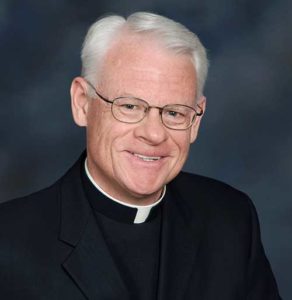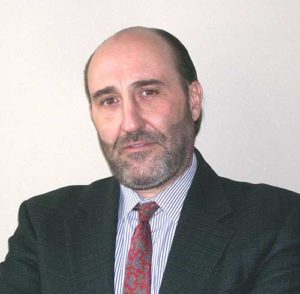ST. FRANCIS — In naming Fr. David Reith vicar for Catholic Charities on July 1, Archbishop Jerome E. Listecki may have had in mind the words of St. Paul in his second letter to the Corinthians: “We are ambassadors for Christ.”

Fr. David Reith was appointed vicar of Catholic Charities, July 1. (Submitted photo courtesy Catholic Charities)
“I was asked by the archbishop to consider the possibility of becoming, as he refers to it, his ambassador for and the voice for Catholic Charities and be, in a sense, his representative,” Fr. Reith said in a July 27 interview.
He is the third vicar appointed by the archbishop to oversee a specific archdiocesan ministry. In June 2015, Fr. Javier Bustos, pastor of St. William, Waukesha, was named vicar for Hispanic ministry. Fr. Tim Kitzke was named vicar general for urban ministry in July 2015.
Fr. Reith said part of that ambassadorship will be making people aware of Catholic Charities.
“I want to make sure that people realize this is an essential part of our Catholic mission and ministry – to be out there servicing God’s people in the sense of the corporal and spiritual works of mercy,” he said.
Fr. Reith sees himself working not only with the Catholic community, but in developing partnerships “with people of good will who are in a positon to help.”
“‘Can I do something to support what you’re doing to make life better for people in our midst?’ That’s where we can partner with people who genuinely want to make a difference,” he said.
The priest welcomes the fundraising that will be part of his work.
“I’ll be networking with people and soliciting support to sustain our mission and increase, potentially, our outreach that would be part of the ministry,” he said, noting people will be motivated to support Catholic Charities because they know ministries are being done well. “I’m not afraid to do what any pastor has to do: Can we get people on board to support us and our mission? To that end, I’m willing to do my part.”
Joins ‘committed’ staff
As he is learning how Catholic Charities works, Fr. Reith said one of the things that impressed him was the commitment of the staff.
“I must tell you there are many people who see that this is not a job for them; it’s more of a vocational interest, a passion and a love,” he said of the more than 100 full-time people the agency employs. “I’m walking into something they are doing very well. I’m delighted with the staff people, their dedication; they’re exemplifying what the church should be about and it’s actually happening in a very beautiful way among us.”

Ricardo Cisneros oversees the day-to-day operation of Catholic Charities as its chief operating officer. (Submitted photo courtesy Catholic Charities)
For Fr. Reith, the “Catholic” in Catholic Charities is a key part of what the agency does.
“I see myself as bringing that religious perspective, I see myself working with keeping that Catholic perspective as it is being a wonderful part of our ministry to serve not only the Catholic community, but people all over in the community,” he said.
Fr. Reith, pastor of St. Dominic, Brookfield, the sixth largest parish in the archdiocese, for 13 years, who will continue to serve in that role, noted the similarity between Pope Francis’ emphasis on the church as a field hospital and the work of Catholic Charities.
“He’s saying the church must be out there among the people. Our local Catholic Charities can be very proud to say, in many ways, we’re doing that,” he said, adding the agency’s work “allows us to see the face of Christ in people in need right in our neighborhoods, right in our midst.”
Focus on serving the poor
With the restructuring of administration at Catholic Charities and Fr. Reith’s appointment as vicar, Ricardo Cisneros, an employee of the agency for nearly nine years, including the last two as interim executive director, will continue to oversee the day-to-day operation of the agency as its chief operating officer. He welcomes the addition of Fr. Reith.
“Fr. Dave strengthens the public image of Catholic Charities,” he said. “With a much better understanding of who we are and where we are, he is going to be very key in making Catholic Charities well known to the community and communicating to the entire community the importance of the role of Catholic Charities, and how their support can directly help people.”
As the priest executes his duties as vicar, Cisneros, who terms himself “a social worker at heart,” will keep the agency focused on serving the poor.
“Our understanding of our role is that we are here to serve people who live in poverty,” he said. “We need to give preferential treatment to the poor; that has to reflect in your management which means you do have to make sure all of your resources are directed to the people that need it the most.”
Cisneros said the name Catholic Charities is misleading for a lot of people because they think the agency only serves Catholics.
“We serve all faiths – everybody,” he said.
‘Highest quality service’
They also misunderstand “charity,” thinking Catholic Charities distributes food and clothing, and provides shelter, which it doesn’t. What Catholic Charities does, and what Cisneros hopes Fr. Reith will emphasize when he speaks to people about its work, is more complex.
“We’re a professional social services organization. What we are charged with is to look at what are the unmet needs of the people living in poverty in the social, psychological areas, and put together a professional approach to provide services,” Cisneros said. “All of our services are professional social services.”
He said that Catholic Charities is “constantly checking the quality of our services.”
“When you are serving the poor and you are serving people who have no other choice but to come to you, you have a moral obligation to provide the highest possible quality service,” he said. “Our clients deserve as good as service as anybody that would pay for the service.”
While Cisneros said Catholic Charities’ ultimate goal is helping the poor – 66 percent of its clients have incomes below $12,000 – he also takes pride in seeing how staff treats all people “with the most respect.”
“It’s not just what we do, but it’s how we do it. A lot of the people who come to us are poor, living in poverty; they have had a lot of negative experiences when they asked for help through different systems. They are not treated very nicely; they’re treated like beggars,” he said. “We pride ourselves in treating everybody with dignity and respect…. If they walk away from us a little better than when they came in with a better sense of themselves, that’s intangible.”
